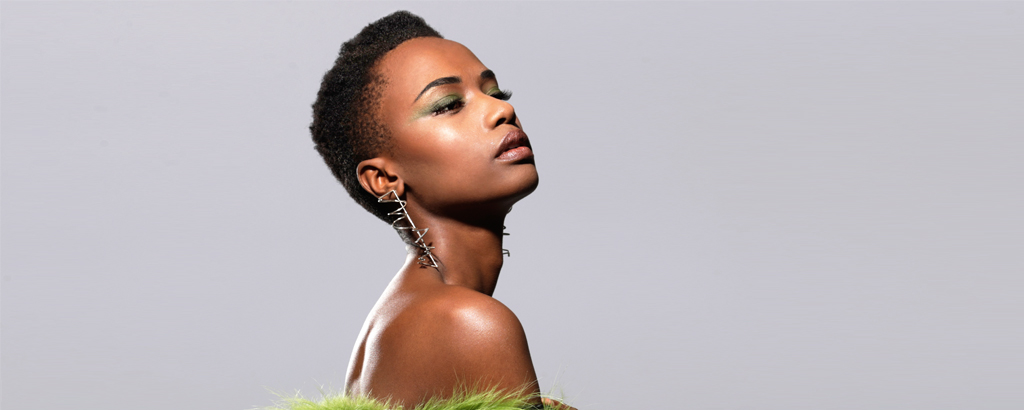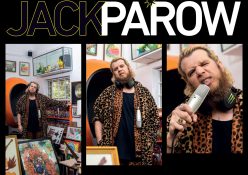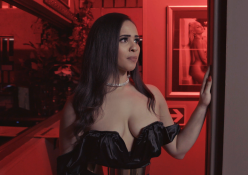Being crowned Miss South Africa on Women’s Day last year, Zozibini Tunzi is embracing the symbolism and showing the world what a true African queen looks like
She looks more like a face you would see on the runways of London and New York, or in the pages of Vogue, with her razor-sharp cheekbones, deep, rich skin tone, edgy ’do, and standing at a statuesque 1.7m. Hers is the type of look that would have fashionistas calling her the ‘next big thing’. But striking features such as newly crowned Miss South Africa Zozibini Tunzi’s have traditionally not been considered worthy in the world of beauty pageants: natural hair, dark skin… We’ve never seen a beauty queen like her on the world stage. And that is exactly what makes this 26-year-old
such a special queen.
CHILD OF AFRICA
Born in rural Eastern Cape, in the small village of eSidwadweni, Zozibini completed her schooling in Butterworth before moving to Cape Town to attend the Cape Peninsula University of Technology to study public relations. Education is important to her and her family. Her mother is a teacher and her father works at the Department of Education in Pretoria. She lists her parents as two of her biggest role models, and credits them and her upbringing for the strong, driven woman she is today: ‘My parents taught me from a young age that nothing in life will ever be handed to me; I have to work for it. My mother taught me resilience, kindness and to not be a pushover.
My father taught me the importance of hard work and a thirst to want to achieve great things. These values are at the core of my being.’After graduating last year, her qualification is coming in handy as she takes on the world: ‘I use my PR qualification every day as Miss South Africa for my personal brand,’ she laughs. ‘Reputation is at the core of every brand and business. I have always been fascinated with the idea of shaping people’s perceptions and seeing situations in a different light, which is why I studied PR in the first place.’ This kind of thinking is exactly how Zozibini is shaking up the beauty-pageant world, helping to change people’s perceptions of what beauty truly is.

BETTER REPRESENT
In a time when more and more people are standing up and asking for inclusive representation in the media – more people of different ethnicities, sizes and abilities – Zozibini’s reason for wanting to enter Miss SA is as relevant and important as ever: ‘I entered this year because I felt like I was wasting away and doing nothing for the betterment of my society and myself,’ she states. ‘I wanted to fight for social causes that are closest to my heart and I went in with the full intention of breaking beauty stereotypes that have, for years, had a negative impact on women all over the world.’
She is, of course, referring to the fact that the media has forever held up white, blonde, blue-eyed, cis women as the standard of beauty to which many people just don’t measure up. ‘So many young girls and women are affected every day by what is considered to be beautiful. Low self-esteem hinders people from reaching their highest potential and can lead to unhappiness and depression,’ she says. For young South African girls, just having someone who looks like them, as Zozibini does, on the world stage – a previously disadvantaged girl with natural hair and a deep complexion – being crowned the most beautiful woman in the country is a huge step in the right direction for inclusivity. And just a few months into her reign, she was praised for shaking up the traditional notion of beauty by choosing to wear a headscarf in her Miss Universe headshot, proudly showing off her roots: ‘Inclusion and representation matters. Beauty is not just one thing and I wanted that to come across in my headshots. ‘We need to groom an army of confident women, and I will not rest until I have done my part in making sure that everyone I come into contact with knows that they are beautiful in all their uniqueness.’

REDEFINING BEAUTY
It may be difficult for some to relate the powerful persona that Zozibini gives off with an industry that many criticise as outdated and oppressive to women.
But she believes platforms such as Miss South Africa are as important as ever: ‘Beauty pageants have been said to be sexist and that they take women a thousand steps backwards. This is not true for Miss South Africa, or for me. It has given me an opportunity to grow into my confidence and womanhood, and have discussions with the most intelligent people and voice my opinions. They give women a chance to lead and be able to advocate for social causes,’ she affirms. ‘I was not drawn to the pageant because I think I am the most beautiful woman in South Africa, but because I have a voice. I stand for a lot of things and I want to be heard.’
One of those social causes is gender-based violence, a key issue in SA that has been in the headlines all too much recently, and she’ll be using her new-found status to fight for the cause: ‘I just want women to live in a country where they are not scared to go into a post office and send mail. A country where women don’t die in their own homes at the hands of those who claim to love them and where young boys are not sexually abused by their teachers at school,’ she says.
CROWING GLORY
Zozibini’s Miss SA crown holds a lot of meaning. ‘I am the first Miss South Africa to have the privilege of wearing the uBuhle crown. The crown is special because it represents a new dawn and a more inclusive representation of South African women. The name of the crown is “uBuhle Bethungo Lenkosazana”, meaning the beauty of the rainbow. Women are multifaceted just like the rainbow – we’re not all the same, but we are equally wonderful,’ explains Zozibini. The exquisite crown was created by American Swiss, the official fine-jewellery partner of Miss SA, and was designed by world-renowned jewellery designer Johan Louw of Uwe Koetter.
 Subscribe to Balanced Life, for more fashion and lifestyle trends.
Subscribe to Balanced Life, for more fashion and lifestyle trends.







